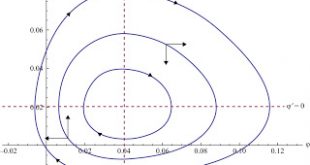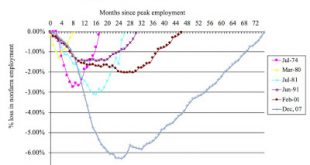By Thomas PalleyA journalist sent me some questions about MMT. My answers are below. 1. What are the major flaws you see within Modern Monetary Theory? (A.) I like to say that MMT is a mix of “old” and “new” ideas. The old ideas are well known among Keynesian economists and are correct, but the new ideas are either misleading or wrong.The essential old idea, which everybody knows, is government has the power to issue money. We used to talk of “printing” money. In today’s electronic world we...
Read More »On the blogs — The Measurement Edition
Here are 15 Common Data Fallacies to Avoid-- Jeff Desjardins at Visual Capitalist on some common mistakes. I like the McNamara fallacy, which is probably common in economics Welfare Versus GDP: What Makes People Better Off-- Geoffrey Bannister and Alexandros Mourmouras at the IMF blog on alternative measures of well-being Inequality and Poverty-- Chris Dillow at Stumbling and Mumbling on the limits of the Gini coefficient
Read More »A predator–prey model to explain cycles in credit-led economies
A paper in the new issue of ROKE by Óscar Dejuan and co-author. From the abstract: This paper develops a predator–prey model to explain cycles in credit-led economies. The predator is the part of the financial sector that issues credit money for non-output transactions. It increases the indebtedness ratio and inflates bubbles that eventually have a negative impact on the real rate of growth (the prey). From this basis, we build a couple of models that may lead to self-contained or...
Read More »Employment losses in historical perspective
My colleague Chris Magee sent this graphs around about employment losses during different recessions. The first one below show all the recession from the 1970s onwards. The next one, which I modified to show just the Great Recession and the Great Depression, is below, and gives a sense of the dimension of the Depression. The sheer size of the Depression is impressive. Even though the last recession is an outlier, it pales in comparison with the Great Depression. You can see in the graph...
Read More »On the blogs — Economic History Edition
When did sustained growth start?-- Dietrich Vollrath on a paper by Jane Humphries and Jacob Weisdorf, in which they show the increase in real wages in the 1600s and preceding the Industrial RevolutionDo we really care whether the profits from American Slavery were reinvested to spur faster growth or not?-- Brad DeLong on Gavin Wright's presentation on the topic of the centrality of slavery for economic growth and the Industrial RevolutionWhat Happened to The Standard of Living During the...
Read More »Goodbye Lula, Hello Failed State
"We are building the Anti-Lula." "So are we." In October 2002, Luiz Inácio Lula da Silva won Brazil’s presidential election and famously argued that hope had defeated fear. In fact, to preempt the fears of local and international finance elites, which threatened capital flight if the Workers’ Party (PT) candidate won, Lula had already signed the infamous “Letter to the Brazilian People” in which he pledged to follow relatively orthodox economic policies. Predictions about his...
Read More »The uses and abuses of economics
Alan Blinder wrote a few days ago in the Wall Street Journal that economic theory has been often abused by politicians. He refers to what he calls the Lamppost Theory of Economic Policy, the notion that: "Politicians use economics the way a drunk uses a lamppost—for support, not illumination." His concerns are fairly conventional. He says: By 2020, higher spending and tax cuts will push the federal budget deficit above 6% of gross domestic product—higher than it ever was in the...
Read More »Is the US hypocritical to Criticize Russian Election Meddling?
By Thomas PalleyThomas Carothers has recently written an article in Foreign Affairs, the prestigious elite journal published by the US based Council on Foreign Relations. The article asks is the US hypocritical for criticizing Russian election medlling? Given the place of publication, the unsurprising conclusion is it is not. The problem is the US is a champion meddler. Consequently, the argument crumbles every time Mr. Carothers reaches for substance. At the end of the day, the defense...
Read More »On the blogs
U.S.-China Relations in the Age of Trump-- An old post by James Fallows, from December 2016, but that I think makes sense to re-read now, after the trade wars with China have been really ignited. Btw, I also recommend Fallows last book, which was on China; Managing Debt Vulnerabilities in Low-Income and Developing Countries-- Tao Zhang at IMF blog on debt vulnerability in developing countries. I wouldn't read too much on their preoccupations, and not even sure they know what the dangers...
Read More »NAKED KEYNESIANISM 2018-03-23 21:12:00
Ilene Grabel's new book, When Things Don't Fall Apart: Global Financial Governance and Developmental Finance in an Age of Productive Incoherence, is out. From Dani Rodrik’s Foreword: “It happens only rarely and is all the more pleasurable because of it. You pick up a manuscript that fundamentally changes the way you look at certain things. This is one such book. Ilene Grabel has produced a daring and delightful reinterpretation of developments in global finance since the Asian financial...
Read More » Naked Keynesianism
Naked Keynesianism








